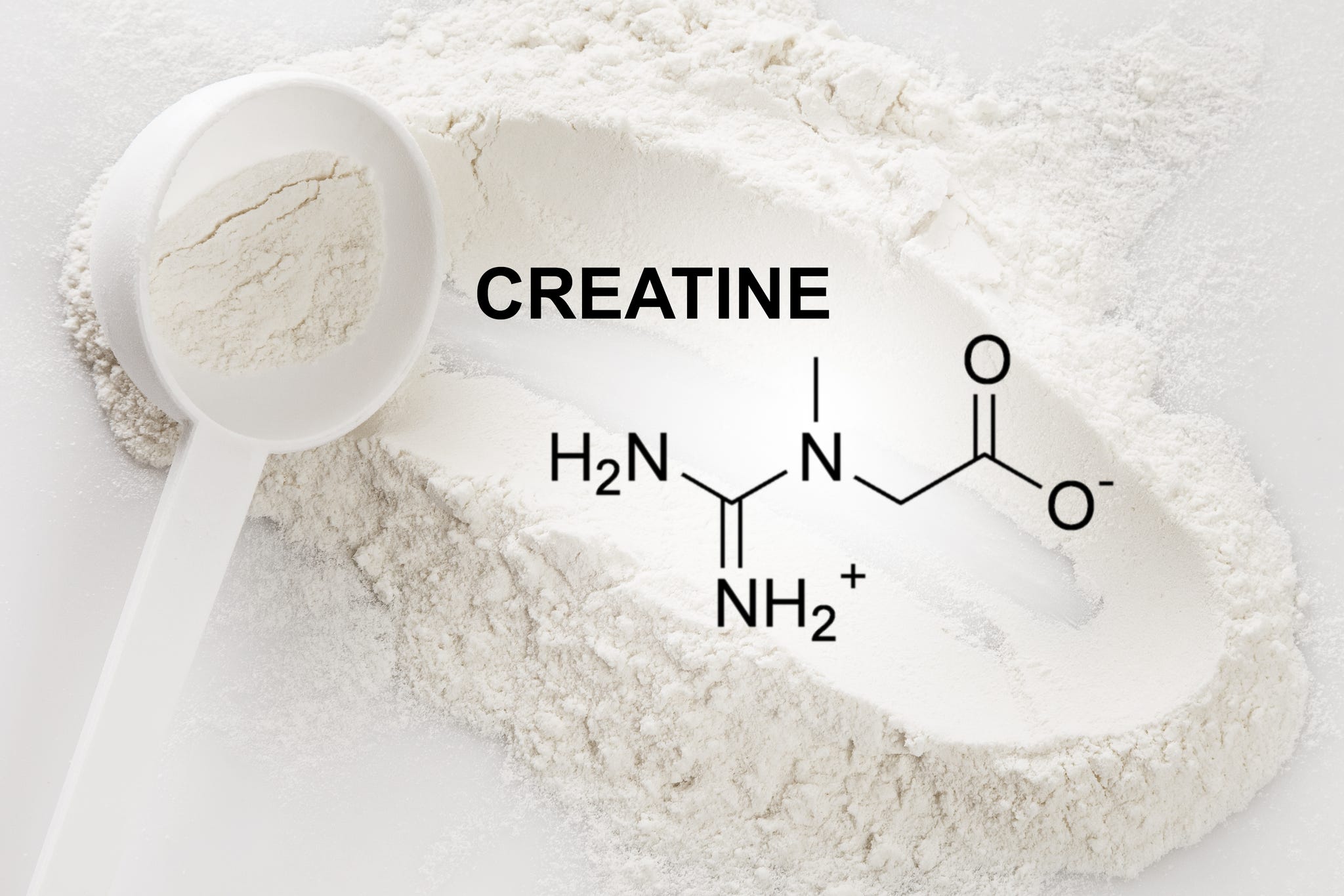Creatine supplementation for older adults: Improving muscle strength as we age
With aging, many adults experience decreased muscle mass and strength known as sarcopenia.
In older adults, muscular strength is a major predictor of health outcomes such as falls, fractures, and mortality (1). It is therefore important to maintain adequate muscular strength to limit these poor health outcomes.
Creatine is a compound that is naturally found in the body that has gained attention from researchers and popular media in the last three decades as a nutritional supplement in the form of creatine monohydrate. Creatine is thought to have a wide range of benefits across all ages.
This article will briefly discuss the current evidence surrounding the use of creatine for older adults (ages >50).
How Creatine Works

Creatine is an organic acid that is naturally produced in the human body and is stored in muscles and the brain (1). A large portion of this creatine is stored as a high-energy molecule that can be utilized to perform high-intensity muscular contractions. These contractions can produce athletic movements like a high jump or everyday movements like standing up from a chair.
About 1-2% of the body’s creatine is degraded everyday and excreted through urine (2). Therefore, the body needs to replenish its creatine levels.
The body has a small capacity to make creatine from other molecules, but also relies on getting creatine from certain foods like red meat and seafood (2).
Creatine can also be taken as a supplement. For example, vegetarians tend to have lower levels of creatine in their muscles due to the lack of meat consumption and may benefit from supplementation. Even so, taking creatine supplements in those who eat meat regularly will also increase muscle creatine levels (3). Lastly, there is some variability in creatine levels between people, meaning that some people will see a bigger increase in muscle creatine levels than others; another reason why supplementation may help.
Research on Creatine in Older Adults
Physical Benefits
Since the 1990s, over 1,000 studies have been published on the use of creatine. From this research, many systematic reviews and meta-analyses (statistical analyses of multiple research studies) have been done to give a better picture of the overall effects of creatine.
Most research into the physical benefits has looked at creatine supplementation in conjunction with weight lifting. In “creatine plus weight lifting” research in older adults (ages ranging from 50s to 70s), there is a large amount of evidence that creatine increases upper body strength (4–8).

On the other hand, there is mixed evidence about the benefits to lower body strength (4,5,7,8), but longer periods of weightlifting (more than 24 weeks) seem to show better results. Lower body strength can help with everyday activities like walking as well as most mountain sports like skiing and mountain biking. The benefits of creatine mentioned above, actively help minimize the effects of sarcopenia.
Only a handful of studies have looked at creatine supplementation without weight lifting and those results are mixed, which means we do not know if creatine has physical benefits on its own (9). That said, there are clear benefits to pairing creatine supplementation with weight lifting.
Cognitive Benefits
There are also promising benefits to the brain from creatine.
One meta-analysis study saw improvements in memory in adults 66-76 years old regardless of the dose of creatine, sex, or geographical origin (10), while a second meta-analysis study saw improvements in short-term memory in adults of any age (11).
While these results are exciting, they are somewhat recent and we expect to better know the effects of creatine on brain function in the near future. There is even now compelling evidence that creatine supplementation can help mitigate the symptoms of, or even help prevent, concussion.
Recommended Doses of Creatine
There are many different formulas used for creatine dosing, but one common strategy is as follows:
- Loading dose: 20g per day spaced out as 4 x 5g per day for the first 5-7 days
- Maintenance dose: 3-5g once per day (exact amount varies)
Think of the loading dose as an initial boost to jumpstart your muscle creatine levels. After that boost, all you need is to maintain your high levels of creatine, and continuing to take high doses has no added benefit which is why it is not recommended. Spreading out the loading dose is more convenient than taking all 20g at once since it is usually mixed into a glass of water/liquid.

Whilst the loading period is popular, it is likely that a low dose taken daily (3-5g) will ultimately prove just as effective, and with less likelihood for side effects, which commonly occur during the loading phase.
Dr. Andy Reed at the Banff Sport Medicine clinic says he adds 5g to his morning coffee as a creative way to get his daily dose (12). Importantly, almost all research about creatine is in the form of creatine monohydrate, so the benefits and risks of any other forms of creatine are not clear.
Potential Risks of Creatine
The high number of research studies on creatine means its risks are well understood.
The only consistent effect is that there is sometimes unexpected weight gain (2). This tends to come from water weight, meaning water is added to the muscles alongside the creatine. This occurs more frequently during the high dose loading period.
Any other risks or case studies of adverse effects that come up in popular media have been refuted by rigorous scientific reports (2).
In short…
… creatine monohydrate is a low-risk supplement that improves physical strength if done alongside a weight lifting program, all of which help maintain the muscles through healthy aging. Creatine also has promising cognitive benefits including benefits to memory. The recommended dose begins with a short loading phase followed by a smaller-dose maintenance phase, but it is likely that daily low doses in the range of 3-5g for most adults will provide just as much benefit.
Expert Contributor

Desmond Young, Masters of Science, Faculty of Kinesiology, Sport, and Recreation, University of Alberta.
References
1. Candow DG, Forbes SC, Kirk B, Duque G. Current Evidence and Possible Future Applications of Creatine Supplementation for Older Adults. Nutrients. 2021 Mar;13(3):745.
2. Kreider RB, Kalman DS, Antonio J, Ziegenfuss TN, Wildman R, Collins R, et al. International Society of Sports Nutrition position stand: safety and efficacy of creatine supplementation in exercise, sport, and medicine. J Int Soc Sports Nutr. 2017 Jun 13;14(1):18.
3. Kreider R, Jung Y. Creatine supplementation in exercise, sport, and medicine. J Exerc Nutr Biochem. 2011 May 15;6:53–69.
4. Devries M, Phillips S. Creatine Supplementation during Resistance Training in Older Adults—A Meta-analysis. Med Sci Sports Exerc. 2014 Feb 26;46.
5. Stares A, Bains M. The Additive Effects of Creatine Supplementation and Exercise Training in an Aging Population: A Systematic Review of Randomized Controlled Trials. J Geriatr Phys Ther. 2020 Jun;43(2):99.
6. Lanhers C, Pereira B, Naughton G, Trousselard M, Lesage FX, Dutheil F. Creatine Supplementation and Upper Limb Strength Performance: A Systematic Review and Meta-Analysis. Sports Med. 2017;47:163–73.
7. Chilibeck PD, Kaviani M, Candow DG, Zello GA. Effect of creatine supplementation during resistance training on lean tissue mass and muscular strength in older adults: a meta-analysis. Open Access J Sports Med. 2017 Nov 2;8:213–26.
8. Dos Santos EEP, de Araújo RC, Candow DG, Forbes SC, Guijo JA, de Almeida Santana CC, et al. Efficacy of Creatine Supplementation Combined with Resistance Training on Muscle Strength and Muscle Mass in Older Females: A Systematic Review and Meta-Analysis. Nutrients. 2021 Oct 24;13(11):3757.
9. Candow DG, Chilibeck PD, Forbes SC, Fairman CM, Gualano B, Roschel H. Creatine supplementation for older adults: Focus on sarcopenia, osteoporosis, frailty and Cachexia. Bone. 2022 Sep;162:116467.
10. Prokopidis K, Giannos P, Triantafyllidis KK, Kechagias KS, Forbes SC, Candow DG. Effects of creatine supplementation on memory in healthy individuals: a systematic review and meta-analysis of randomized controlled trials. Nutr Rev. 2023 Apr 1;81(4):416–27.
11. Avgerinos K, Spyrou N, Bougioukas K, Kapogiannis D. Effects of creatine supplementation on cognitive function of healthy individuals: A systematic review of randomized controlled trials – PMC. Exp Gerontol. 2018;108:166–73.
12. Mastering Aging and the musculoskeletal system – BSM Foundation [Internet]. 2021 [cited 2023 Apr 1]. Available from: https://bsmfoundation.ca/mastering-aging-and-the-musculoskeletal-system/






